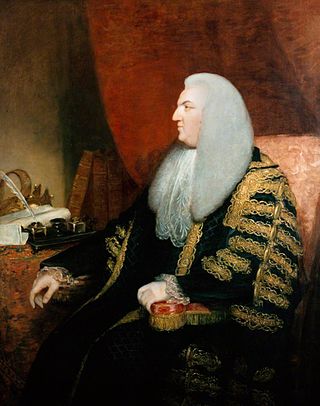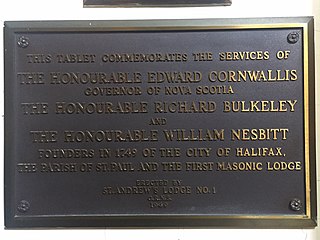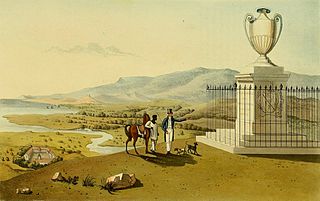Related Research Articles

William Beckford was a Jamaican-born planter and Whig politician who twice served as Lord Mayor of London in 1762 and 1769. One of the best known political figures in Georgian era London, his vast wealth derived from the sugar plantations and hundreds of slaves he owned in the British colony of Jamaica. In Britain, Beckford was a supporter of the Whig party, including Prime Minister William Pitt, 1st Earl of Chatham. He also publicly supported progressive causes and frequently championed the London public.

Fletcher Norton, 1st Baron Grantley, PC was an English lawyer and politician who sat in the House of Commons from 1756 to 1782 when he was raised to the peerage as Baron Grantley.

Abraham Bedford Venable was a Virginia lawyer, planter and politician who served in the U.S. House of Representatives and briefly as U.S. Senator, as well as in the Virginia House of Delegates.
Edward Holland was the first English Mayor of Albany, New York, from 1733 to 1740. He was the 40th Mayor of New York City from 1747 to 1756, becoming the only man to serve as mayor of both Albany and New York City.

Robert Carter Nicholas was a Virginia lawyer, patriot, legislator and judge. He served in the Virginia House of Burgesses and its successor, the Virginia House of Delegates. He became the last treasurer of the Colony of Virginia, and sat on the first High Court of Chancery, one of the predecessors of the Supreme Court of Virginia.
Peter Burrell, of Langley Park, Beckenham, Kent, and Mark Lane, Fenchurch St., London, was a British merchant and politician who sat in the House of Commons from 1722 to 1756.

Hibbert House, also known as Headquarters House, is the head office of the Jamaica National Heritage Trust. It is located at 79 Duke Street in Kingston, Jamaica. It was built by Thomas Hibbert, a wealthy young English merchant, in 1755 to serve as his residence. Hibbert migrated to Kingston in 1734, at a time when Jamaica was becoming the largest and wealthiest of the British Caribbean islands and the largest single destination of African slaves. In the early 1750s, he formed a partnership with Nathaniel Sprigg to serve as factors for slaves, purchasing them off the ships from Africa and reselling them to planters and others in Jamaica. Hibbert also helped found a major West Indian house in London, trading in sugar and rum.

William Nesbitt was a lawyer and political figure in Nova Scotia. He served as a member of the Nova Scotia House of Assembly from 1758 to 1783.
Colonel Edward Hill was a Virginia planter, soldier and politician. In addition to representing Charles City County for many terms in the House of Burgesses, fellow members three times selected him as its Speaker, and he sat in the Virginia General Assembly's upper house, the Virginia Governor's Council in 1651 as well as from 1660-1663. Burgesses also sent Hill to Maryland to put down Richard Ingle's 1646 rebellion, and he acted as the colony's temporary governor before ceding to the proper governor, Leonard Calvert, but later contested nonpayment of monies promised to him and Virginia militia troops for that action. Col. Hill also led the Charles County and Henrico County militia and Pamunkey native Americans against other tribes in Hanover County in 1656, with less success.

Thomas Hibbert (1710–1780) was an English merchant and plantation owner who became a prominent figure in colonial Jamaica.
Rose Fuller FRS was a West Indies plantation owner and politician who sat in the House of Commons from 1756 to 1777.
Isaac Weaver Jr. was an American politician from Pennsylvania who served as a Democratic-Republican member of the Pennsylvania House of Representatives 1797 to 1803, including as Speaker from 1800 to 1803. He resigned as Speaker on March 1, 1803, to take the office of Pennsylvania Treasurer, at that time an office elected by the General Assembly.

Edward Morant (1730–1791) was a British politician and plantation owner who sat in the House of Commons for 26 years from 1761 to 1787.
Edward Jordon (1800–1869), or Edward Jordan, was a leading campaigner for equal rights for free people of color in Jamaica during the nineteenth century.
Robert Osborn (1800–1878) was a Jamaican newspaper editor and campaigner for equal rights for free people of color.
Thomas Sutton was the speaker of the House of Assembly of Jamaica in 1691-92 and 1698.
Colonel Edward Stanton was the speaker of the House of Assembly of Jamaica in 1704.
References
- ↑ Cundall, Frank. (1915) Historic Jamaica. London: Institute of Jamaica. pp. xvi-xviii.
- ↑ "Edward Manning". Legacies of British Slavery database. Retrieved 30 January 2023.